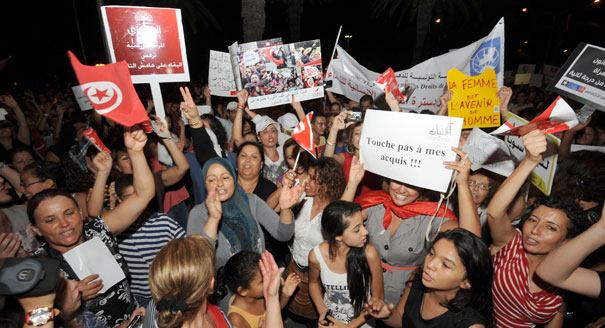Registration
You will receive an email confirming your registration.
Women in the Middle East and North Africa continue to struggle to gain access to job opportunities and remain vulnerable to poverty. Are political transitions in countries such as Egypt and Tunisia ushering in an era of new opportunities for women’s rights, representation, and access to labor in the region? Or is the change igniting a downward trend and depriving women of their already limited rights?
In a two-day seminar in Rabat, Morocco, hosted by the Carnegie Middle East Center and the Friedrich Ebert Stiftung, a distinguished panel of experts examined the status of women under the new dynamics and explored the emerging opportunities and challenges in achieving gender equality in the region. The conference opened with remarks from Soukaina Yabouri on behalf of Her Excellency Bassima Hakkaoui, minister of Solidarity, Women, Family and Social Development in Morocco; Leila Rhiwi of UN Women in Morocco; and Nadia Hashem Aloul, founder of the National Society for Enhancement of Freedom and Democracy in Jordan. The three women stressed the importance of legislation regarding labor and electoral laws.
Women, Constitution Writing, and Political Transition
- Role of Women in the “Arab Spring”: This session discussed women’s role in the political arena and civil society in light of the recent uprisings in the region. Fatima Sadiqi of the University of Fez in Morocco, drawing largely on Tunisia, stressed that the advancement of women’s rights is the ultimate test for any future democracy.
- Political Islam: Sadiqi asserted that religious identity and faith are two different and possibly opposing concepts in politics. There is a move towards separating politics from religion but not in the form of secularization, she added.
- Gender-Conscious Constitution Drafting: Rhiwi discussed the four principles behind crafting a gender-conscious constitution, including:
- “Constitutionalization”: The Convention to Eliminate All Forms of Discrimination Against Women (CEDAW) principles must be incorporated into the new constitution, especially articles concerning non-discrimination based on gender and the effective equality of men and women
- Participation: Specific mechanisms must be set up to ensure the inclusion of women in constitution writing assemblies.
- Inclusion/appropriation: Constitution drafting must be democratic and involve all segments of society, as well as prominent members in civil society
- Implementation: Finalizing a new constitution isn't an end in itself, Rhiwi added. A real effort to reform the judicial system must be undertaken in parallel, to ensure that laws are effectively implemented.
Women’s Empowerment in the Labor Market
- Women’s Employment & Economic Rent: Mary Kawar, senior economist at the International Labour Organization in Lebanon, stated that the region contains the highest rates of female and youth unemployment in the world, caused mainly by the lack of economic diversification and an extreme reliance on revenues from rents. In contrast to the creation of an abnormally large public sector through the rentier state model, the informal sector employs a large proportion of populations, though in extremely precarious working conditions.
- Cultural Impacts on Economy: Arwa Al Badani of the Sheba Center for Strategic Studies in Yemen noted that the choice of a career path and the gender division of labor are directly affected by cultural limitations. Wage disparities and lower retirement ages also diminish incentives for women and employers, further restricting women’s amount of participation in the workforce.
- Access to Resources: Badani argued that there is an urgent need to improve access to resources, land, and capital for women. In order to close the gap between genders in the workforce, Badani also stressed the importance of regularly monitoring the implementation of penalties against companies who discriminate based on gender.
Cultural and Social Factors
- Negative Representations of Women in Arab Media: Selma Boumaza from the NABNI Foundation in Algeria explained that in the media, strong women are solely represented as historical or patriotic figures within the prism of a national struggle. Moreover, Arab viewers are exposed to conflicting representations of women due to channels’ contrasting discourses, which range from the extremely conservative to the very progressive. This variety, which reflects the different sentiments the Arab audience has towards women’s rights, often serves to reinforce certain reactionary beliefs.
- Arranged Marriages and Family Law: Moha Ennaji, a gender expert at the University of Fez in Morocco, analyzed household and familial conservatism. He argued that underage arranged marriage is one of the biggest obstacles to women’s emancipation and participation in the active world. He called for a revision in family law, urging the consideration of a ban on arranged marriages. Even though additional field research is required to thoroughly understand the household structure and trends of family life, panelists stressed the need for a change in attitudes and perceptions through education and an improved standard of living.
Need to Develop Gender-Sensitive Policies
Bachir Abou Jamous of UN Women in Jordan and Lina Hundaileh, founder of the Organization of Young Entrepreneurs in Jordan, stressed the importance of legislation to resolve gender inequality. Both called for a system of checks and balances to supervise the implementation and regulation of gender laws, especially concerning enforcement and penalization. Furthermore, they agreed, a more proactive approach is required in order to achieve gender parity on party lists in legislative elections.
